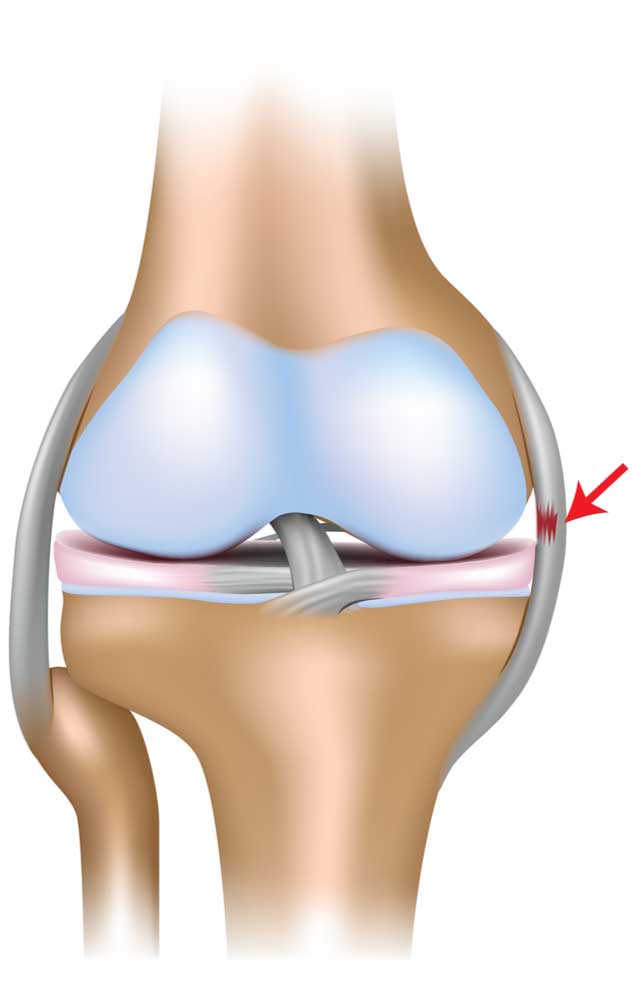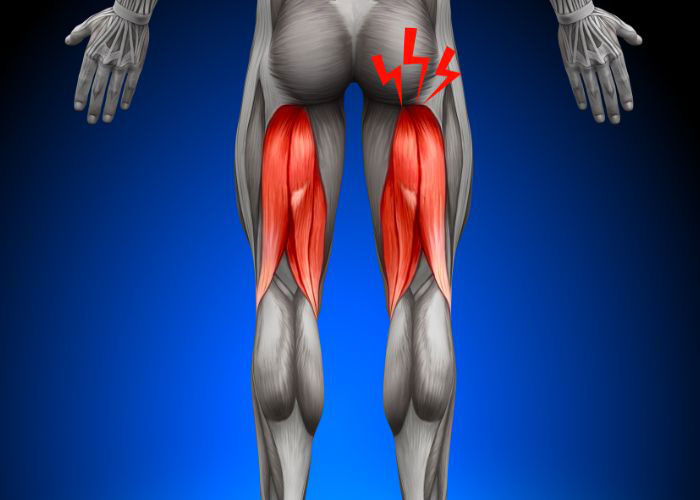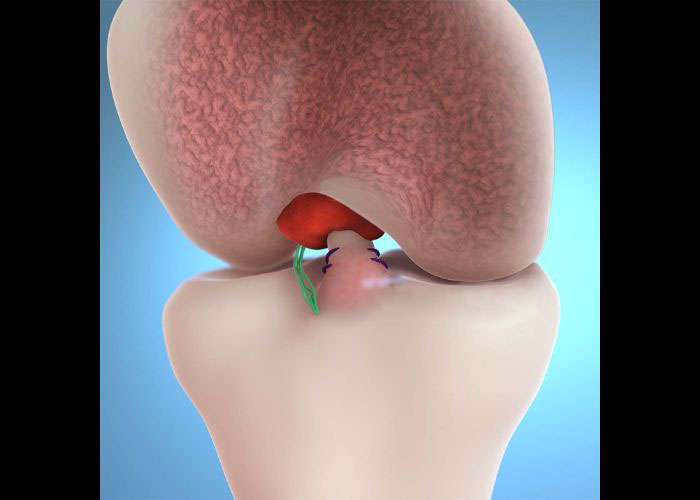What is a medial collateral ligament injury?
There are two major groups of elastic tissue bands (ligaments) affiliated with the knee joint: the cruciate ligaments and the collateral ligaments. The medial collateral ligament (MCL), found along the inner knee on the outside of the knee joint, originates from the medial epicondyle, a bony prominence on the inner femur (thigh bone), and attaches to the inner tibia (shin bone). This ligament functions in concert with the lateral collateral ligament (LCL) to provide stability to the knee while also protecting the knee against unusual movements. The MCL can sustain an injury if a substantial force is imposed on the outer knee causing the knee joint to shift sideways. This ligament is the most commonly injured ligament of the knee joint and is often seen among athletes that participate in contact sports, such as wrestling or football. An MCL injury is classified into three different grades by the amount of ligament damage, and they range from simple stretching of the ligament to a complete rupture. Dr. Ronak Mukesh Patel, orthopedic knee specialist serving patients in Sugar Land, Pearland, and the Houston, Texas area, has the knowledge and understanding, as well as substantial experience, in treating patients who have experienced an MCL injury.

What are the symptoms of an MCL injury?
Because the symptoms reported with a medial collateral ligament (MCL) injury are similar to a number of other knee conditions, it is important to consult an orthopedic knee specialist for an appropriate diagnosis. Common complaints of an MCL injury can include:
- Decreased range of motion
- Swelling and tenderness along the inner portion of the affected knee
- Pain along the inside of the knee immediately following an injury
- Instability of the knee joint, especially with more severe tears
- A “locking” or “catching” sensation of the knees with movement
How is an MCL injury diagnosed?
Dr. Patel will obtain a comprehensive medical history, including the initial injury and any other previous knee conditions. A thorough physical examination will follow and include an assessment of knee range of motion and evaluation for any knee instability. Diagnostic imaging may be requested by Dr. Patel. X-rays can identify if any bone-related injuries resulted from the knee injury. Magnetic resonance imaging (MRI) is the best diagnostic tool to confirm a medial collateral ligament (MCL) as well as discern any damage to the other structures within the knee joint.
What is the treatment for an MCL injury?
Non-surgical treatment:
Non-surgical therapies alone can be a successful treatment option for the majority of patients with medial collateral ligament (MCL) injuries. The injured ligament can be protected during the healing process with a hinged knee brace. A combination of RICE (rest, ice, compression, elevation) and non-steroidal anti-inflammatory medications (NSAIDs) are encouraged for pain management and to decrease the inflammation associated with this condition. Dr. Patel will prescribe a physical rehabilitation program with a focus on stabilizing and restoring knee joint function once the pain and inflammation are well-controlled.
Surgical treatment:
In the event of failed non-surgical therapy, or when a patient sustains a more severe or complex medial collateral ligament (MCL) tear especially with multiple ligament tears of the ACL, PCL, and/or LCL, surgical intervention may be necessary to restabilize the knee joint. The MCL is surgically repaired by excising damaged portions of the MCL and the ligament is sutured back together or securely fastened to the bone. Occasionally, significant damage to the ligament may warrant MCL reconstruction with the implementation of a tendon graft, either from the patient (autograft) or donor tissue (allograft).
MCL Injury Specialist

Do you participate in sports that involve sudden twisting motions, or are you involved in contact sports? The medial collateral ligament (MCL) in the knee can sustain an injury during certain twisting movements, or from a direct hit to the outside of the knee. Soccer, football, MMA and LaCross players are prone to MCL injuries. MCL injury specialist, Doctor Ronak Mukesh Patel, provides diagnosis as well as surgical and nonsurgical treatment options for patients in Houston, Sugar Land, and Pearland, TX who have sustained an MCL injury in their knee. Contact Dr. Patel’s team today!








